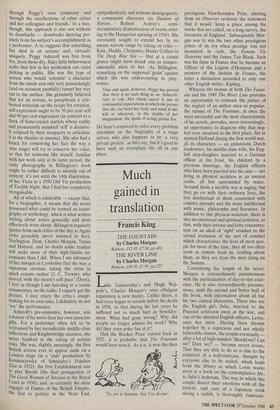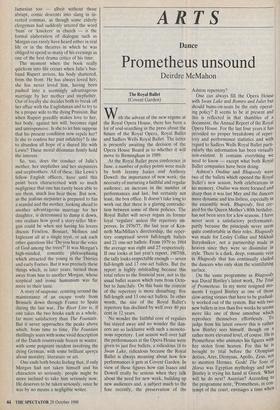Much gained in translation
Francis King
THE FOUNTAIN by Charles Morgan
Robson, £12.95, f7.50; pp.431
THE RIVER LINE by Charles Morgan
Robson, £10.95, £5.95; pp.227
Like Galsworthy's and Hugh Wal- pole's, Charles Morgan's once effulgent reputation is now murky. Unlike theirs, it had even begun to tarnish before his death in 1958, so that during his last years he suffered not so much hurt as bewilder- ment. What had gone wrong? Why did people no longer admire his work? Why did they even poke fun at it?
Had the Booker Prize existed back in 1932, it is probable that The Fountain would have won it. As it is, it won the then 'To err is human, but rni divine'. prestigious Hawthornden Prize, eliciting from an Observer reviewer the statement that it would 'keep a place among the works that are called, on a long survey, the literature of England.' Subsequently Mor- gan was to win the two other prestigious prizes of an era when prestige was not measured in cash, the Femina Vie Heureuse and the James Tait Black. Such was his fame in France that he became an Officer of the Legion d'Honneur and a member of the Institut de France, the latter a distinction accorded to only one other English writer, Kipling.
Whereas the reissue of both The Fount- ain and the 1949 The River Line provides an opportunity to estimate the justice of the neglect of an author once so popular, the reissue of The Fountain, at once the most successful and the most characteristic of his novels, provides, more interestingly, an opportunity to diagnose why that neg- lect ever occurred in the first place. Set in neutral Holland during the first world war, all its characters — an aristocratic Dutch landowner, his middle-class wife, his Eng- lish step-daughter married to a German officer at the front, his children by a previous marriage, the English officers who have been paroled into his care — are living in physical isolation in an ancient castle, all but surrounded by water. Around them a terrible war is raging; but they go on with their ordinary lives, the less intellectual of them concerned with country pursuits and the more intellectual with music, philosophy and literature. In addition to this physical isolation, there is also an emotional and spiritual isolation, so that, with their intense and lofty concentra- tion on an ideal of 'right' conduct to the virtual exclusion of the sort of conduct which characterises the lives of most peo- ple for most of the time, they all too often seem as remote from us, reading about them, as they are from the men dying on the Somme.
Considering the length of his novel, Morgan is extraordinarily parsimonious with the particularities of day-to-day exist- ence. He is also extraordinarily parsimo- nious, until the second and better half of the book, with information about all but his two central characters. These two are the English girl, Julie, married to the Prussian aristocrat away at the war, and one of the interned English officers, Lewis, once her tutor. Having been thrown together by a capricious and not wholly believable chance, the couple eventually after a lot of high-minded 'Should we? Can we? Dare we?' — become secret lovers. That they are able to do so is due to the existence of a wall-staircase, thought by everyone else to be sealed, which leads from the library in which Lewis works away at a book on the contemplative life, to Julie's bedroom. The way in which this couple dissect their emotions with all the patient, rapt care of a Japanese cook slicing a radish, is thoroughly Jamesian. Jamesian too — albeit without those abrupt, comic descents into slang in in- verted commas, as though some elderly clergyman had suddenly uttered the word `bum' or `knickers' in church — is the formal elaboration of dialogue such as Morgan can rarely have heard either in real life or in the theatres in which he was obliged to spend so many of his evenings as one of the best drama critics of his time.
The moment when the book really quickens into life occurs when Julie's hus- band Rupert arrives, his body shattered, from the front. He has always loved her; she has never loved him, having been pushed into a seemingly advantageous marriage by her mother and stepfather. Out of loyalty she decides both to break off her affair with the Englishman and to try to be a proper wife to the dying Prussian. But when Rupert greedily makes love to her, her body, against her will, becomes rigid and unresponsive. Is she to let him suppose that his present condition now repels her?
Is she to confess her past infidelity? Is she to abandon all hope of a shared life with Lewis? These moral dilemmas firmly hold the interest.
So, too, does the conduct of Julie's mother, her stepfather and her stepsisters and stepbrothers. All of these, like Lewis's fellow English officers, have until this point been characterised with so much negligence that one has rarely been able to see them, much less hear them. But now, as the jealous stepsister is prepared to fan a scandal and the mother, looking ahead to another advantageous marriage for her daughter, is determined to damp it down, one realises how good a story-teller Mor- gan could be when not having his lovers discuss Fendlon, Bossuet, Molinos and Inglesant all at a single tryst, or ask each other questions like 'Do you hear the voice of God among the trees?' It was Morgan's high-minded, romantic philosophising which attracted the young in the Thirties and early Forties. But it was precisely these things which, in later years, turned them away from him to another Morgan, whose sceptical and ironic humanism was far more to their taste.
A story of suspense, centring around the maintenance of an escape route from Brussels down through France to Spain
during the last war, The River Line is, if one takes the two books each as a whole, far more satisfactory than The Fountain.
But it never approaches the peaks above which, from time to time, The Fountain thrillingly soars with some vivid description of the Dutch countryside frozen in winter, with some poignant incident involving the dying German, with some brilliant apercu about morality, literature or art.
One ends both books feeling that, if only Morgan had not taken himself and his characters so seriously, people might be more inclined to take him seriously now. He deserves to be taken seriously, since he was by no means a negligible writer.



























































 Previous page
Previous page